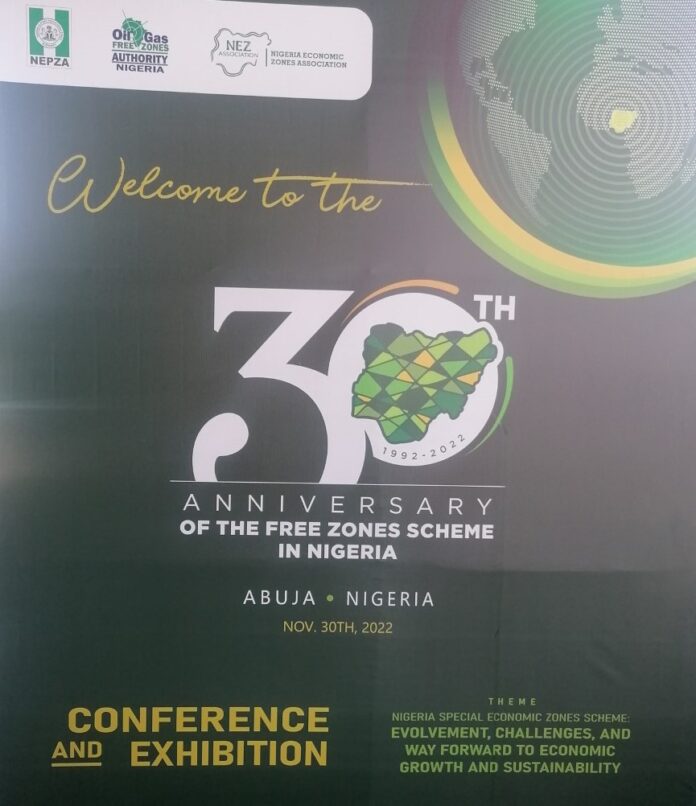The 30th anniversary of the Special Economic Zones Scheme in Nigeria has kicked off with stakeholders commending the achievements but regret there were still bottlenecks hampering the delivery of key economic developmental indices compared to what has been attained by Free Zone schemes in other locations.
The three day Anniversary which opened in Abuja on Wednesday has as its theme, “Nigeria Special Economic Zones Scheme: Evolvement, Challenges and Way Forward To Economic Growth and Sustainability”.
The anniversary which opened discussions that would benefit industry participants and Special Economic Zones in the continent, would witnessed technical sessions designed to proffer solutions to the challenges facing the scheme.
In his remarks by Mr Tijjani Y. Kaura, the Managing Director of Oil and Gas Free Zone Area (OGFZA), said that the objectives of the scheme has not been without challenges over the years.
Notwithstanding the enormous challenges, the scheme has recorded significant milestones within the last thirty years.
The expected take-away from this anniversary, he said was for all stakeholders to deliberate and interact with the aim of evolving a sustainable strategic and perspective roadmap that will enhance the development and attractiveness of scheme in Africa.
“The scheme has been used to boost economies of nations around the globe, while depleting African resources.
“We hope to change the tide and narrative in the spirit of shared prosperity, by harnessing the enormous human, intellectual and natural resource capacities that Africa is endowed with. In order to effectively harness these, we can no longer work in silos.
“It may interest you to know that the earliest formal Free Zone Scheme in Africa started in 1885 when the Berlin Conference agreement was signed, but without an African representation.
“Specifically, the Niles, Congo and Niger Rivers were Free Trade Zones.
“Thanks to the African Continental Free Trade Agreement that is driven by Africans and geared towards achieving an African continental integrated economy.’’
He said that the objectives of the scheme which encompass driving industrialization via export promotion, technology, skills and knowledge transfer, job creation, local and foreign direct investment attractiveness.’’
“This conference offers us an opportunity to evaluate the status of the Free Zones Scheme, assess our performance since inception, and examine how we have evolved, then deliberate and collectively chart a growth-oriented approach to improving the scheme.
“In these three (3) days, there would be presentations and exhibitions as well as panel sessions on the facets of the Special Economic Zones scheme.
“Through the lively discussions that will ensue, we will undoubtedly learn from each other, through the exchange of views, sharing experiences and appreciating critical contributors to the evolution, as well as the survival of the scheme in Nigeria.
“As the Chief Executive Officer of the Oil and Gas Free Zones Authority (OGFZA), it is a tremendous honour to play host to the African Special Economic Zones community and to hundreds of delegates from all over Africa.
It is indeed a remarkable day for Africa, a major milestone in our drive to promote Special Economic Zones development in Africa.
“Taking cognizance of our comparative advantage in the hydrocarbon sector, Nigeria established the first free zone dedicated to oil and gas in the world.
“This has tremendously contributed to Nigeria’s Gross Domestic Income, in an unprecedented manner. Between 1996 and now, the zones have attracted over 200 Companies with over $16.6 billion and created over 200,000 direct and indirect jobs, thereby contributing to local content development.
“We are still open to partnership to develop the enormous potentials in the mid and downstream sectors in line with the Nigeria’s national development plan, with immediate emphasis on the Medium-Term National Development Plan,2021-2025, while providing model development centres for achieving the agenda 2063 of the African Union, in collaboration other international development partners.




